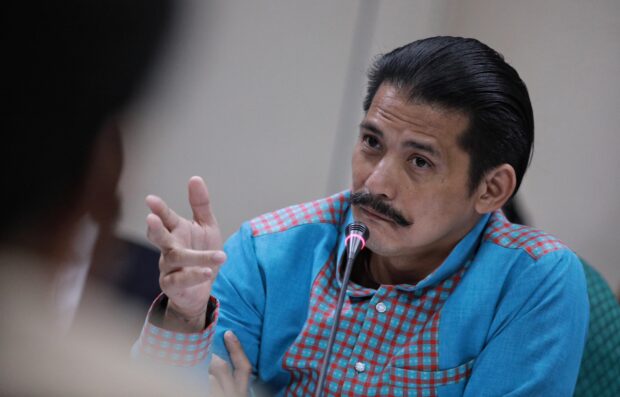FOI as priority legislation pushed

Sen. Robin Padilla during one of the committee hearings in the Senate. (File photo from the Senate Public Relations and Information Bureau)
MANILA, Philippines — Sen. Robinhood Padilla said on Monday that he would call on Malacañang to include the passage of the Freedom of Information (FOI) bill as part of the priority measure that it wants to be passed in the second year of the Marcos administration.
At the hearing of the Senate Committee on Public Information and mass media, Padilla said he would ask the executive branch to include the proposed FOI law among the measure to be prioritized by the Legislative Executive Development Advisory Council, noting how the bill’s passage has been “long overdue.”
“Getting information is the right of the Filipino taxpayers who pay our salaries … The FOI bill has been languishing in Congress for more than three decades,” Padilla said as his committee tackled four bills that sought to establish the FOI law.
An FOI law will expand the current Executive Order No. 2, issued by former President Rodrigo Duterte, which recognizes the people’s right to information, but it covers only agencies under the executive department.
“Making the FOI a law will strengthen the executive order by fulfilling the government’s mandate and institutionalizing penalties for violators,” he said.
Article continues after this advertisementAccording to Padilla, the FOI bill seeks to cover all three branches of government — executive, legislative, and judiciary, as well as constitutional bodies and local governments.
Article continues after this advertisementIt will also cover government-owned and controlled corporations, government instrumentalities, and state universities and colleges.
Right to obtain SALNs
A proposal in one of the bills also seeks to recognize the people’s right to obtain details of government officials’ statements of assets, liabilities and net worth (SALN).
The proposed FOI law also aims to cover transactions, documents or records that involve public interest, such as budget expenditures, bidding contracts, procurement plans, debts, and contracts worth P50 million and up.
But Padilla clarified that the FOI measure does not cover details on the use of confidential funds, especially those pertaining to national security or defense, law enforcement, foreign affairs, presidential communications privilege, and information in executive sessions of Congress.
Presidential Communications Office Undersecretary Cherbett Karen Maralit has expressed support for the bill and gave assurance that they would support the inclusion of the FOI bill in the Ledac priority measures.
Jose Torres Jr., director general of the Philippine Information Agency, suggested that the proposed measure be further expanded to include added protection and accountability for whistleblowers and strengthen the “culture of integrity” among public officials.